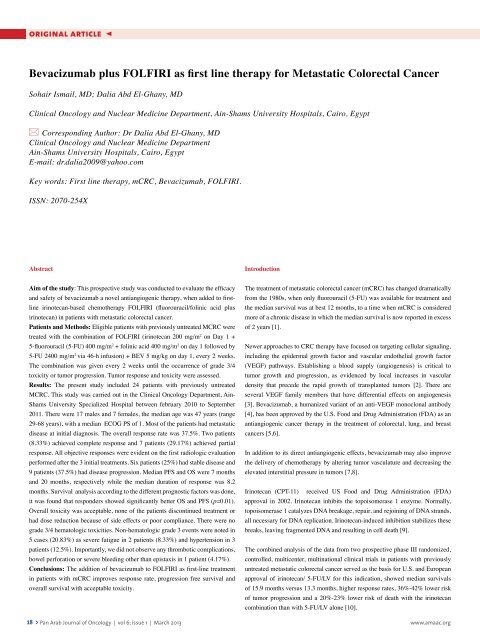original article <strong>Pan</strong> <strong>Arab</strong> <strong>Journal</strong> <strong>of</strong> <strong>Oncology</strong> | vol 6; issue 1 | March 2013The treatment <strong>of</strong> metastatic colorectal cancer (mCRC) has changed dramaticallyfrom the 1980s, when only fluorouracil (5-FU) was available for treatment andthe median survival was at best 12 months, to a time when mCRC is consideredmore <strong>of</strong> a chronic disease in which the median survival is now reported in excess<strong>of</strong> 2 years [1].Newer approaches to CRC therapy have focused on targeting cellular signaling,including the epidermal growth factor and vascular endothelial growth factor(VEGF) pathways. Establishing a blood supply (angiogenesis) is critical totumor growth and progression, as evidenced by local increases in vasculardensity that precede the rapid growth <strong>of</strong> transplanted tumors [2]. There areseveral VEGF family members that have differential effects on angiogenesis[3]. Bevacizumab, a humanized variant <strong>of</strong> an anti-VEGF monoclonal antibody[4], has been approved by the U.S. Food and Drug Administration (FDA) as anantiangiogenic cancer therapy in the treatment <strong>of</strong> colorectal, lung, and breastcancers [5,6].In addition to its direct antiangiogenic effects, bevacizumab may also improvethe delivery <strong>of</strong> chemotherapy by altering tumor vasculature and decreasing theelevated interstitial pressure in tumors [7,8].Irinotecan (CPT-11) received US Food and Drug Administration (FDA)approval in 2002. Irinotecan inhibits the topoisomerase 1 enzyme. Normally,topoisomerase 1 catalyzes DNA breakage, repair, and rejoining <strong>of</strong> DNA strands,all necessary for DNA replication. Irinotecan-induced inhibition stabilizes thesebreaks, leaving fragmented DNA and resulting in cell death [9].The combined analysis <strong>of</strong> the data from two prospective phase III randomized,controlled, multicenter, multinational clinical trials in patients with previouslyuntreated metastatic colorectal cancer served as the basis for U.S. and Europeanapproval <strong>of</strong> irinotecan/ 5-FU/LV for this indication, showed median survivals<strong>of</strong> 15.9 months versus 13.3 months, higher response rates, 36%-42% lower risk<strong>of</strong> tumor progression and a 20%-23% lower risk <strong>of</strong> death with the irinotecancombination than with 5-FU/LV alone [10].www.amaac.org
In patients with mCRC, the addition <strong>of</strong> bevacizumab to chemotherapy has beenshown to improve survival [11]. In phases 1 and 2 trials <strong>of</strong> the treatment <strong>of</strong>colorectal cancer, the addition <strong>of</strong> bevacizumab to commonly used chemotherapyregimens increased the response rate, the median time to disease progression,the median duration <strong>of</strong> survival and was generally well tolerated and didnot demonstrate dose-limiting toxicity or interactions with commonly usedchemotherapy regimens [12-14].In a large, phase III, randomized, doubleblind, placebo-controlled clinical trialconducted by Hurwitz et al, on patients with previously untreated mCRC, theaddition <strong>of</strong> bevacizumab to irinotecan/fluourouracil/leucovorin increasedsurvival from 15.6 months to 20.3 months, (HR = 0.66; P < .001). The 1-yearsurvival rates were 63.4% and 74.3%, in favor <strong>of</strong> the bevacizumab arm.Similarly, PFS, response rate, and duration <strong>of</strong> response were all improved [15].Bevacizumab was also shown to produce similar benefits in OS, PFS, and RRwhen combined with fluorouracil/folinic acid plus oxaliplatin (FOLFOX-4) inthe second-line setting [16].The goal <strong>of</strong> this trial was to investigate the safety and efficacy <strong>of</strong> bevacizumabas a novel antiangiogenic therapy when added to first-line irinotecan-basedchemotherapy FOLFIRI in patients with mCRC. The primary end points wereprogression free survival and tumor response rate. Secondary end points wereoverall survival, duration <strong>of</strong> response and safety.Patients and MethodsPatient CharacteristicsPatients age ≥18 and < 70 years with histologically confirmed mCRC, withbidimensionally measurable disease, an Eastern Cooperative <strong>Oncology</strong> Group(ECOG) performance status <strong>of</strong> 0-2 and a life expectancy <strong>of</strong> more than threemonths. Adequate hematologic, hepatic, and renal function (including urinaryexcretion <strong>of</strong> no more than 500 mg <strong>of</strong> protein per day) was also required.Exclusion criteriaIncluded prior chemotherapy or biologic therapy for metastatic disease (adjuvantor radiosensitizing use <strong>of</strong> fluoropyrimidines with or without leucovorin morethan 12 months before study entry was permitted), radiotherapy or surgery formCRC was permitted if completed ≥4 weeks before study treatment, clinicallysignificant cardiovascular disease, clinically detectable ascites, pregnancy orlactation, use <strong>of</strong> full-dose anticoagulants or thrombolytics; serious nonhealingwound, ulcer, or bone fracture; clinically significant bleeding diathesis orcoagulopathy; proteinuria >500 mg/24 hours and known CNS metastases.Treatment PlanThe 24 eligible patients were treated with the combination <strong>of</strong> FOLFIRI (irinotecan 200 mg/m 2 on Day 1 + 5-fluorouracil (5-FU) 400 mg/m 2 + folinicacid 400 mg/m 2 on day 1 followed by 5-FU 2400 mg/m 2 via 46-h infusion) +bevacizumab 5 mg/kg on day 1, every 2 weeks. Treatment with the same doses<strong>of</strong> bevacizumab and FOLFIRI was repeated every 2 weeks until the occurrence<strong>of</strong> grade 3 or 4 toxicity or tumor progression.Patient evaluationsBaseline evaluations included a medical history, physical examinations,vital signs, performance status determination, complete blood count withdifferential and platelet counts, blood coagulation variables, serum chemistrypr<strong>of</strong>ile and urine protein analysis tests. All the patients had a contrast-enhancedpelviabdominal and chest CT scans, magnetic resonance imaging (MRI) <strong>of</strong> thebrain to exclude brain metastasis, before starting the treatment. After the baselineevaluation, tumor status was assessed every 6 weeks for the first 24 weeks <strong>of</strong>the study and then every 12 weeks for the remainder <strong>of</strong> therapy. All completeand partial responses required confirmation at least four weeks after they werefirst noted.Toxicities were evaluated during each cycle and graded according to the NationalCancer Institute Common Toxicity Criteria (NCI-CTC) [17], version 3.0.Treatment Response EvaluationRadiographic response was measured by comparing each patient’s baseline CTscans imaging performed before the initiation <strong>of</strong> therapy and serial CT scansimaging performed every 6 weeks after starting therapy. Imaging responsecriteria were defined as follows: partial response (PR) was determined if thecontrasted images showed a greater than 50% decrease in the area <strong>of</strong> enhancementprovided that the patient was stable or improved clinically. Complete response(CR), was determined by the resolution <strong>of</strong> all measurable abnormalities on thecontrast images for any patient who also was stable and improved clinically.Progressive disease (PD), an increase in the degree <strong>of</strong> enhancement by at least25%, appearance <strong>of</strong> a new lesion, or deterioration in the patient’s clinical statusthat was thought to be related to tumor progression. The patient was deemed tobe stable if the criteria for a partial or complete response or tumor progressionwere not met.Survival analysisThe collected data was revised, coded, tabulated and introduced to a PC usingStatistical package for Social Science (SPSS 15.0.1 for windows; SPSS Inc,Chicago, IL, 2001). Data was presented and suitable analysis was done accordingto the type <strong>of</strong> data obtained for each parameter.-Kaplan-Meier Survival Analysis [18]: a descriptive procedure for examiningthe distribution <strong>of</strong> time-to-event variables. Overall Survival was measured fromthe date <strong>of</strong> entry into the study until death from any cause or last follow-up.Progression free survival was measured from the date <strong>of</strong> entry into the studyuntil date <strong>of</strong> first evidence <strong>of</strong> disease progression.-Log rank test examine the equality <strong>of</strong> survival times across groups. P value:level <strong>of</strong> significant; P>0.05: Non significant (NS), P< 0.05: Significant (S),P









